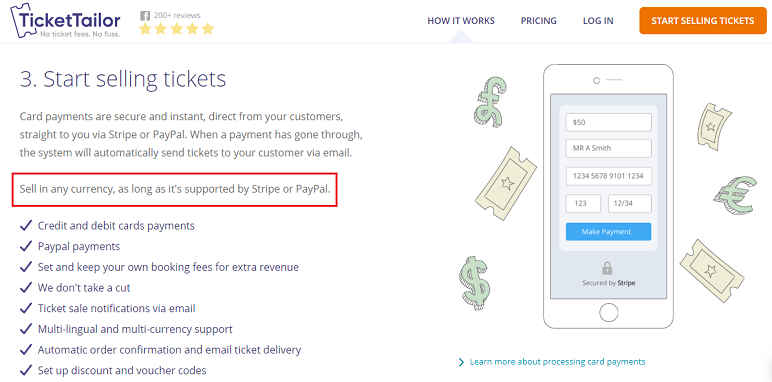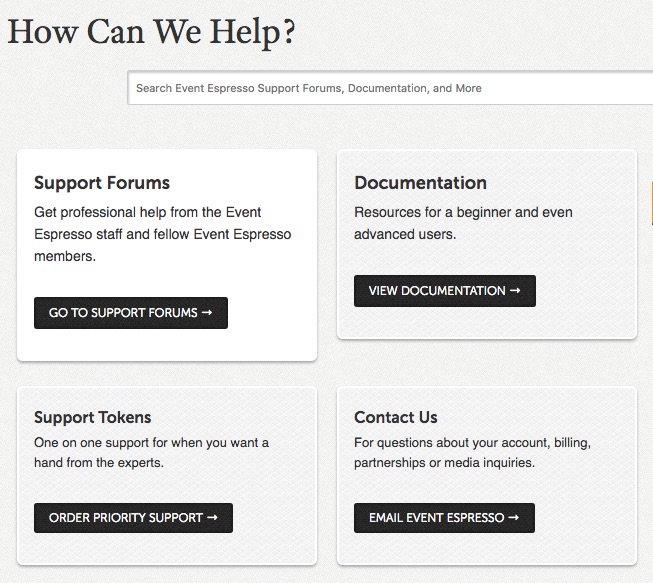
Keeping track of online registration and ticketing activities for your event can be pretty difficult. In addition to selling tickets, you have to set up payment gateways, send tickets to attendees, and gather analytics.
Venue ticketing systems take the heavy lifting out of online ticketing, venue management, payment processing, and other event-related activities.
In this article, we’ll compare and contrast hosted vs open source venue ticketing systems by stepping through their key features, pricing models, and support. Before we begin, let’s quickly take a look at what venue ticketing systems are.
What Are Venue Ticketing Systems?
Venue ticketing systems are software that, at the bare minimum, offer online ticketing, seating management, and payment processing functionality. They make it easy for businesses and event organizers to manage ticket sales, seats, and attendee admissions for their event venues.
As an event organizer, you have the option to go with a hosted venue ticketing system or an open source venue ticketing system. The option that’s right for you depends on your specific needs. For instance, you’ll have to determine whether you’ll be selling tickets solely on your own event site or if you’ll be looking into using an external, SaaS [Software-as-a-Service] system.
Hosted Venue Ticketing Systems
Hosted venue ticketing systems are offered through a SaaS platform. These systems are best for businesses and enterprises that need to execute a multi-channel ticketing strategy i.e. selling event tickets online, on-site, through mobile, and kiosks. This type of multi-channel ticketing strategy allows event organizers to reach their audience on a variety of different platforms.
Ticket Tailor is a hosted venue ticketing system.
Open Source Venue Ticketing Systems
Alternatively, many event organizers may want to simply deploy an event ticketing solution on their website and minimize costs and the resources required to manage a multi-channel strategy.
Event Espresso is an open source venue ticketing system.
Hosted vs Open Source Venue Ticketing Systems: A 3-Step Comparison
Venue ticketing systems are designed to help event organizers manage and automate online ticketing activities such as selling tickets, scanning tickets at check-in, processing payments, and much more.
Here, we’ll take a look at how hosted venue ticketing systems and open source venue ticketing systems are different in terms of their features and functionality, pricing, and support.
Features and Functionality
Most venue ticketing systems – hosted or open source – offer the same core features that include online ticketing, online box office, payment processing, mobile check-in, and social media functionality.
When you sign up with a hosted venue ticketing system, you’re essentially hosting your website on the service provider’s servers. What this means is that you have to abide by the platform’s terms and conditions. One of the major disadvantages of this sort of arrangement is that you don’t have complete control over when (and how) you get paid.
Some hosted venue ticketing platforms will charge you a per ticket fee in addition to the monthly (or annual) charges for using the platform. They offer certain payment processors – generally, only Stripe and PayPal.

On the other hand, open source venue ticketing systems (like Event Espresso) give you complete control over your payments. When you install open source venue ticketing software on your website, you’ll have the option to choose which payment processor(s) you’d like to integrate and link your own merchant account to it. This way, you’ll essentially be getting paid as soon as you sell a ticket instead of having to follow a payout schedule.
Event Espresso offers a variety of different payment integrations. So this means that you can choose which one works best for your system. For instance, if you are already using PayPal to accept online payments, then you can easily connect your PayPal account to Event Espresso and start taking payments for your events! Or choose a payment option that works for you.
In addition to this, Event Espresso offers:
- Multiple ticketing and pricing options, multiple dates and times per event, ticket selector, and ticketless events.
- Multiple attendees and group registrations.
- Ability to check-in event attendees online.
- Mobile apps for ticket scanning and attendance tracking.
- Social sharing functionality.
- Built-in attendee and venue manager.
- Ability to set up an allocated seating selector or integrate with Seating Chart a third-party seating management plugin.
Price
When evaluating software, it’s important to consider how much it will cost you to set everything up and maintain it.
The cost of getting started with a hosted venue ticketing system varies from provider to provider. Ticket Tailor, for example, will set you back $25 per month on their most basic plan which supports up to 5 active events and 250 ticket sales per event. It’s also important to note that the basic plan includes Ticket Tailor branding on your box office.
Open source venue ticketing software won’t cost you a dime to get started. The Event Espresso plugin, for example, has a Decaf version that you can use to set up your online ticketing website up for free. The Decaf version is a leaner version of the premium licenses offered and it includes:
- Online event ticketing and registration functionality.
- Payment processing using PayPal Express Checkout.
- Automated confirmation emails.
- Mobile apps for ticket scanning and attendance tracking.
Open source solutions make it easy for event organizers and businesses to set everything up and begin selling right away. And whenever you’re ready to kick things up a notch, you can purchase a Premium Support License to gain access to advanced functionality.

Support
If you’re not particularly tech-savvy, you’ll probably need some sort of tech support from the software developers to set your ticketing website up and start selling.
Premium, hosted venue ticketing platforms offer support to their customers through their own knowledge bases. This typically includes a FAQs section and tutorials.
In most cases, open source software doesn’t come with commercial support from the developers. Instead, you get access to an active community of users that provides high-quality support – for free! Before you decide on a venue ticketing system, make sure the software you’re opting for has a large user base with active support on forums.

Event Espresso powers over 40,000 event websites and has a Support Forum on their site that users can access to ask questions and get answers from other community members. It’s a great way to get started with open source software and you always have the option to purchase a Premium Support License to gain access to premium support directly from the developers and advanced functionality.
Choosing Between Hosted vs Open Source Venue Ticketing Systems
Once you know what you’re looking for, choosing the right venue ticketing solution should be pretty simple.
If you’re hosting a large event and need to be able to leverage a multi-channel ticketing strategy that allows you to sell tickets through your website, at the door, through mobile, and through kiosks, a hosted venue ticketing system might be the right solution for you.
However, if you’re just getting started, go for an open source venue ticketing solution. You’ll be able to set everything up and begin selling without spending a dime. And, as you grow, you can purchase a Premium Support License to get access to advanced functionality and support.
Simply put, open source tools give you more control in terms of payment processor integrations, how and when you get paid, your site’s look and feel, and which advanced features you want to use.
Conclusion
Hosted and open source venue ticketing systems are both excellent solutions for event organizers looking to sell tickets through an online box office system. Both offer neat features like ticket scanning, payment processing, and mobile-based attendance tracking.
We compared and contrasted both offerings and, hopefully, you’re in a good position now to make an informed decision and take things further.
Between hosted venue ticketing systems and open source venue ticketing systems, which one are you leaning towards and why? Share your thoughts in the comments section below.

